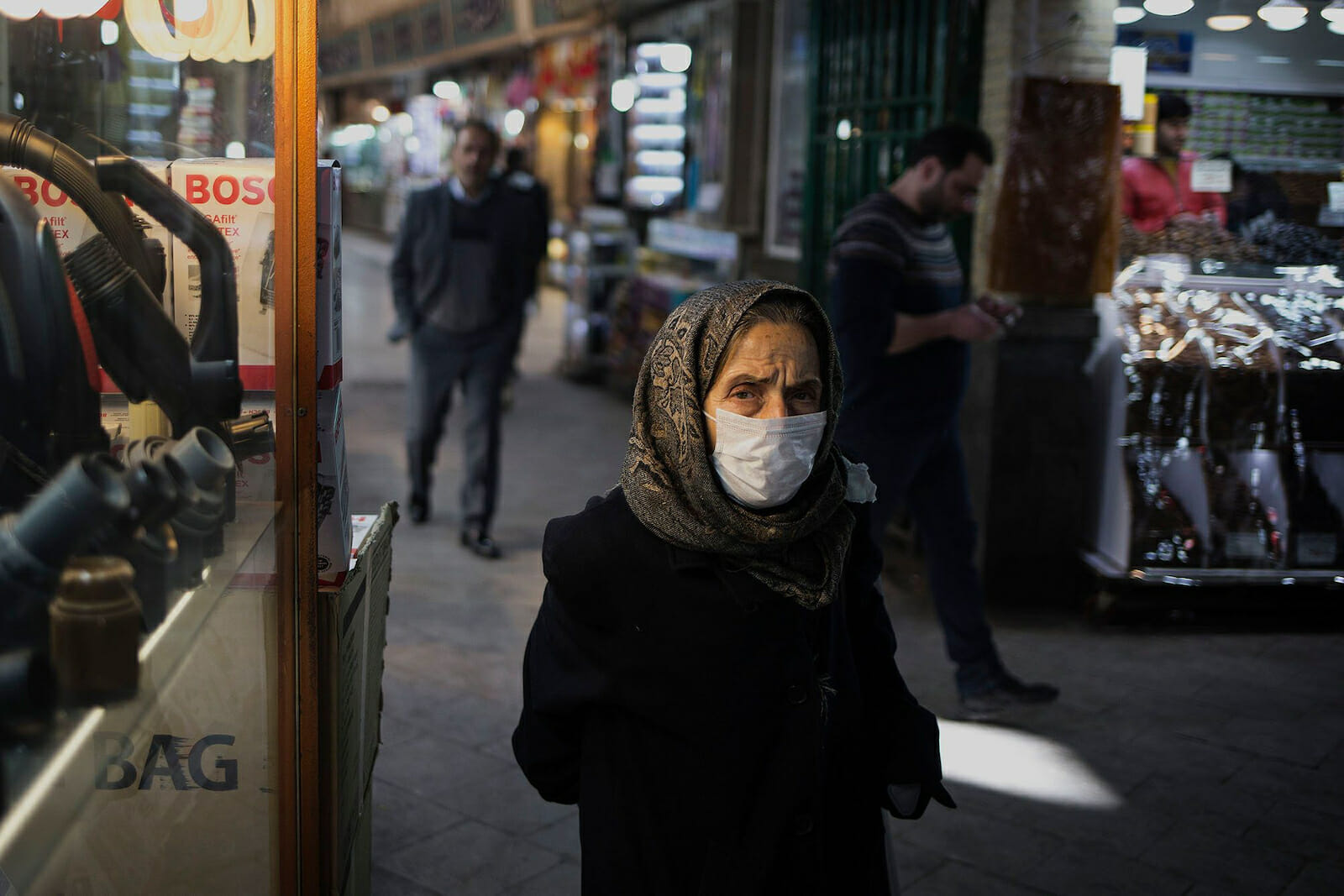
How will Iran’s Sanction-ridden Economy Cope with the Coronavirus?
The spread of the COVID-19 virus in Iran is no longer a national crisis. It is a national tragedy! While there is widespread uncertainty about the exact number of people who have tested positive and the number of casualties, there is no doubt about the negative impact of COVID-19 on Iran’s economy.
To understand the economic impact of the coronavirus in Iran we must take a look at the country’s economic conditions in recent months. Iran was in the midst of multiple economic and diplomatic crises when the first cases of coronavirus were detected in early-February.
Under the pressure of unilateral U.S. sanctions and economic mismanagement, the economy suffered a nine percent decline in 2019 and many experts were predicting zero percent growth in 2020, which was considered an improvement relative to last year. Any hopes for a reduction of tensions that could have led to economic stabilization and a possible economic recovery were dashed in early January after the U.S. assassination of Qassem Suleimani on January 3rd and Iran’s limited retaliation against a U.S. military base in Iraq on January 8. Iran’s mistaken downing of a Ukrainian commercial aircraft on the same day and the initial cover-up also caused further damage to business confidence and Iran’s travel and tourism industry.
The spread of the coronavirus under these circumstances has worsened the economic conditions significantly and it is likely to depress the domestic economic conditions to unprecedented levels in the short run. Had the government been proactive in preventing the spread of the virus when it was first detected in early February, the socio-economic damage could have been partly contained. Unfortunately, the government ignored the multiple warnings by health ministry officials because it wanted to make sure the ceremonies for the anniversary of the Islamic Revolution on February 13 and the parliamentary elections on February 20th were not interrupted.
This ill-advised delay led to the rapid spread of the coronavirus to many areas of the country before official warnings were issued. Furthermore, the official statistics about the number of identified cases and casualties has been challenged by several members of parliament who have claimed that the government is severely under-reporting the number of cases. As a result, there is a widespread sense of distrust about the spread of the virus, which has caused anxiety and forced people to substantially reduce their work and business activities.
Non-oil Exports
Lack of transparency and the failure of the Iranian government to prevent international travel also led to the arrival of coronavirus in several countries through travelers from Iran. This development forced several governments to impose travel and trade restrictions on Iran. These restrictions have sharply reduced, and in some cases have all but eliminated Iran’s trade with its neighbors such as Turkey, Iraq, and Afghanistan, which have emerged as her largest export markets in recent years.
Before the coronavirus interruption, Iran’s average monthly exports of goods to Iraq and Turkey stood at $650 million and $400 million respectively. The border trade and truck trade with these countries has played a crucial role in the promotion of Iran’s non-oil exports in the past two years, as the country has seen a sharp reduction in its oil exports due to U.S. sanctions.
Iranian New Year
Traditionally, February 20th to April 5th is the busiest season for Iranian retail and tourism-related businesses because of the Iranian New Year, which starts on March 20th. For many small and medium-sized businesses, this six-week period counts for 25% of their annual revenue. They will suffer huge losses this year, as people are likely to cut back their normal shopping and travel activities significantly because of the COVID-19 virus.
Several provinces that have traditionally welcomed a large number of New Year (Nowruz) tourists, such as Isfahan and Guilan, have openly announced that they will not accept visitors this year because of the virus. Hundreds of expat Iranians are also expected to cancel their new-year visits. These are mostly high-income Iranian professionals and their families that have stronger purchasing power than domestic tourists. This severe decline in New Year tourism and spending will cause heavy losses for millions of small businesses in retail and tourism-related industries.
Self-Isolation, Quarantine and Economic Activities
Thousands of medium and large scale industries are not only hit by a sharp reduction in demand, but also a sharp increase in workers that are staying home in fear of coronavirus. The construction industry, petrochemicals and the auto industry have all experienced severe reduction in their activity levels. As the financial losses of these industries mount it is not clear how they can pay the salaries of their employees and avoid bankruptcy without government support.
Government’s Response
Similar to other countries that are struggling with the spread of coronavirus the Iranian government has created an economic task force and announced a number of measures to support the economy. Steps announced so far include tax forgiveness and financial support for businesses. There is no indication yet of the government offering direct income support to private-sector workers who have lost their sources of income. However, it is only a matter of time before the government has to sharply increase its subsidies and income support expenditures. This sharp increase in spending will coincide with weak oil revenues and declining tax revenues. Consequently, the fiscal deficit, which was already high before the coronavirus, will be even larger this year and since the government has to borrow more money from the central bank, the money supply will also sharply increase, resulting in much higher inflation rates.
Social Anger and High Risk of Public Unrest
A growing number of Iranians blame the government for the rapid and nationwide spread of the coronavirus. They believe that it failed to restrict travel to China and to quarantine the city of Qum, when the first cases were detected in that city. Large segments of the society are under unprecedented social and economic stress because of the coronavirus and the conditions are likely to get worse in the next few weeks.
These conditions will increase the likelihood of spontaneous and uncoordinated social unrest that can spark in one city and quickly spread to many regions of the country. Such an uprising might be similar to the October 2019 unrest that followed the increase in the price of gasoline and led to a large amount of damage to public and private properties. Although the government will be able to crush such an uprising with its strong Revolutionary Guards and Baseej resistance force, the eruption of violence can lead to a further setback for commercial and industrial activity.

